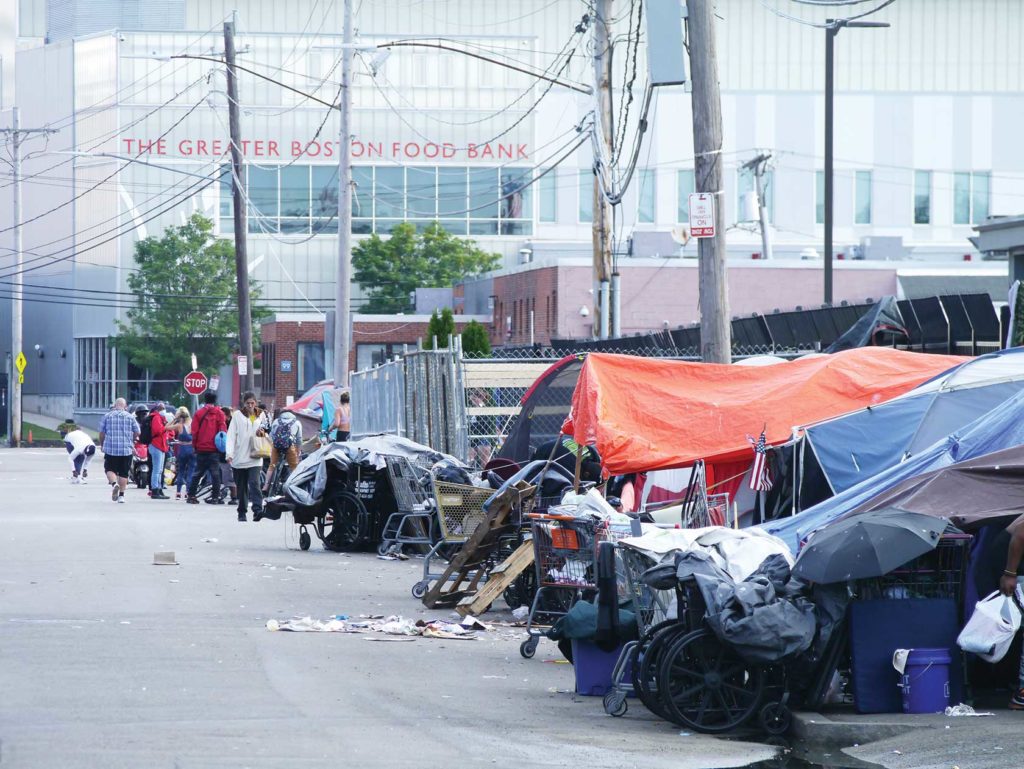
Boston Mayor Michelle Wu announced last week that the city plans to clear encampments in the area surrounding Massachusetts Avenue and Melnea Cass Boulevard no later than Jan. 12 by connecting people living in tents to appropriate services, including supportive housing that is or will be made available in coming weeks.
Dubbed “Mass and Cass,” the area is a hub of drug activity and abuse that has grown substantially in recent years. Wu, who previously put on pause former acting-Mayor Kim Janey’s tent removal policy, has inherited a humanitarian crisis from city officials in previous administrations who have attempted to keep the problem at bay through combinations of law enforcement sweeps and localized service delivery. Wu thinks her plan, while not a silver bullet, will promote safety in the area, especially in coming winter months.
“With these actions, our goal is to bring residents out of the cold and into supportive housing, to change the status quo in this area and citywide,” Wu said in a statement. “Our team is taking every possible action to alleviate the humanitarian crisis at Mass Ave. and Melnea Cass Boulevard and keep this area clear of encampments moving forward.
Informed by a survey of those living in tents earlier this month, the city team, led by Senior Advisor Monica Bharel, Boston Public Health Commission Executive Director Bisola Ojikutu and Housing Chief Sheila Dillon, has identified dozens of “low-threshold” supportive housing placements, including at three recently chosen locations within five miles of Mass and Cass. The three, which will offer services and provide housing with no demands made of those who accept, will be the EnVision Hotel in Mission Hill, with a 41-bed transitional housing program operated by Victory Programs; the Roundhouse Hotel on Mass Ave, which will be a temporary site with room for 60 individuals and have services operated by Boston Medical Center; and the Lemuel Shattuck Hospital at the Mattapan edge of Franklin Park, which will have multiple programs running concurrently.
Bay Cove Human Services, which will administer the housing units at the Shattuck, will have 17 new beds for women to provide “acute substance use treatment and connections to the next level of care” while the “cottage community,” as the transitional housing at the Shattuck is being called, will include wraparound services in collaboration with the Massachusetts Executive Office of Health and Human Services and operated by Commonwealth Care Alliance and Eliot Human Services.
“The situation at Mass and Cass is a public health and humanitarian crisis that encompasses chronic homelessness, mental health and substance use disorders. That’s why we’re taking a public-health-oriented approach to respond to this crisis. We are working every day to address the barriers faced by each person living in these encampments and to connect them with the medical care, substance use treatment and housing that they need,” said Ojikutu.
Other sites that will have beds made available in conjunction with the mayor’s plan are the Pine Street Inn, which will open low-threshold shelter beds for up to 30 men with housing case management and medical care, St. Francis House at 39 Boylston St, in downtown Boston, and the Woods-Mullen Shelter on Massachusetts Avenue near Melnea Cass Boulevard.
Wu has previously announced that her aim is at least 200 low-threshold units be made available. In response to South End and Roxbury residents who have borne the brunt of the crisis on Mass and Cass and have been calling for services and shelters to be scattered outside of their neighborhood, the mayor’s office says city officials will continue to “aim to lower barriers to beds at existing city-owned shelters and explore additional low-threshold options across the city.”
Any tents that remain after the Jan. 12 cutoff date will be addressed with the city’s existing encampment protocol, according to the mayor’s office. This protocol, to be carried out by the Boston Public Health Commission, Boston Police Department, Inspectional Services Department, and Department of Public Works, includes removal notice in advance and the opportunity for storage of belongings. Acting Police Commissioner Gregory Long said BPD is “fully committed to partnering with our city’s public health and housing agencies to assist the individuals living in the Mass and Cass area with their transition to supportive housing and to keeping this area clear of encampments moving forward.”
Wu administration officials also said the city will maintain an ongoing presence, including outreach and street cleaning, “so that further encampments do not develop.”
Dillon said in a statement, “These placements will allow individuals to receive and accept the services they need to stabilize their lives and plan for the future” and “the City will work on strengthening the connections and coordination between treatment and housing as it continues to address this issue.”






